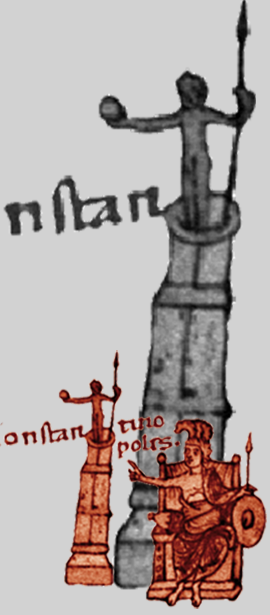Byzantinische Dichtung im 'langen' 12. Jahrhundert
Text und Kontext (FWF-Projekt: P28959: 01.10.2016–30.09.2020)
Die byzantinische Dichtung bis 1081 wurde in den letzten zehn Jahren durch die von Marc Lauxtermann und Floris Bernard verfassten Studien “Byzantine Poetry from Pisides to Geometres” und “Writing and Reading Byzantine Secular Poetry, 1025–1081” umfassend beleuchtet. Im Gegensatz dazu mangelt es für die Dichtung der Komnenenzeit an einer ähnlichen Studie. Das Projekt „Byzantinische Dichtung im „langen“ 12. Jahrhundert (1081–1204): Text und Kontext“ / „Byzantine Poetry in the ‘Long’ Twelfth Century (1081–1204): Texts and Contexts“ zielt darauf ab, die ersten Schritte zur Abdeckung dieser Forschungslücke in Hinblick auf die mangelnde Erörterung und Wertschätzung der Dichtung dieses Zeitraums vorzunehmen.
Hofdichtung, Lehrdichtung, Satire und Schedographie in Versen, sowie Gedichte, die mit der „Rhetoric of Poverty“ zu tun haben, sind nur einige der gängigen Gattungen des 12. Jahrhunderts, die für die Verwendung von Versen für diverse Zwecke, verschiedene Adressaten und Auftraggeber während dieser Periode eingesetzt wurden. Obwohl viele dieser Gattungen schon früher bestanden haben, erhöhte sich ihre Produktion während dieses Zeitraums wesentlich im Vergleich zu den unmittelbar vorangehenden und nachfolgenden Jahrhunderten.
Es ist Hauptziel des Projekts, die Dichtung der Komnenenzeit in Zusammenhang mit den verschiedenen Kontexten der Produktion und Darbietung (dem Hof, der Schule, den Theatra, der Kirche etc.) und auf der Basis von heterogenen diskursiven Formen und Gattungen (wie z.B. Epos, Satire, gelegentliche Dichtung sowie Lehr- und Briefdichtung) zu untersuchen. Das Projekt konzentriert sich dabei auf das umfassende Studium der komnenischen Dichtung aus verschiedenen Perspektiven (wie z.B. Mäzenatentum, Autorschaft, Verbreitung und Mobilität von Texten, Ausbildungssystem und „Performance“) und erörtert dessen prominenten Platz im literarischen und soziokulturellen Kontext des 12. Jahrhunderts. Es berücksichtigt auch die poetische Produktion in der Peripherie des Reiches (wie z.B. in Sizilien und Athen), ebenso vernachlässigtes Schrifttum von weniger bekannten oder anonymen Dichtern.
Bilder zur Konferenz, 13.-15. Juni 2018 ((c) A. Rhoby)
PROGRAMM ZUM VORTRAGSABEND, 17. JUNI 2019
PROGRAMM ZUR KONFERENZ "Poetry in the Eastern Mediterranean from the 11th to the 15th Century Transcultural Perspectives", 24. Jänner 2020
Kooperationspartner
• Dr. Eirini Afentoulidou-Leitgeb–Austrian Academy of Sciences (project “The Dioptra of Philippos Monotropos”) • Prof. Theodora Antonopoulou–Athens University (Byzantine literature and philology) • Prof. Floris Bernard–Ghent University (11th-century poetry) • Prof. Kristoffel Demoen–Ghent University (project “Database of Byzantine Book Epigrams”) • Prof. Ivan Drpić–University of Washington (Art History and epigrams) • Prof. Wolfram Hörandner–Austrian Academy of Sciences (Byzantine literature and philology) • Prof. Elizabeth Jeffreys–University of Oxford (project “Manganeios Prodromos”) • Prof. Michael Jeffreys–University of Oxford (project “Manganeios Prodromos”) • Prof. Marc Lauxtermann–University of Oxford (Byzantine Poetry 'Text and Context') • Prof. Przemyslaw Marciniak–University of Silesia, Katowice (project “An Intellectual History of Twelfth-Century Byzantium–Appropriation and Transformation of Ancient Literature”) • Dr. Georgi Parpulov–University of Birmingham (Art History and manuscripts) • Prof. Claudia Rapp–University of Vienna/Austrian Academy of Sciences (Social History) • Prof. Juan Signes Codoñer–University of Valladolid (project “El autor bizantino”) • Dr. Foteini Spingou–University of Edinburgh (project “Anthologizing the Occasion: Medieval Poetic Anthologies and Cultural Memory”) • Prof. Dr. Alexandra Wassiliou-Seibt–University of Thessalonica (project “Metrical Legends on Byzantine Lead Seals”)
Publikationen
W. Hörandner - A. Rhoby - N. Zagklas (eds.), A Companion to Byzantine Poetry (Brill's Companions to the Byzantine World 4). Leiden - Boston 2019
I. Nilsson - N. Zagklas, “Hurry up, reap every flower of the logoi!” The Use of Greek Novels in Byzantium. Greek, Roman & Byzantine Studies 57 (2017) 1120-1148
G. Paoletti, 'Like a speechless fish'. Poetry and Toothache in Twelfth-century Byzantium (submitted to a peer review journal)
G. Paoletti, The δευτέρα φύσις of a Lost Romance: how Manasses' AK survived through other sources (in preparation)
A. Rhoby - A. Paul, Konstantinos Manasses. Verschronik. Übersetzt, kommentiert und mit einer Einleitung versehen (Bibliothek der griechischen Literatur 87). Stuttgart 2019
A. Rhoby - N. Zagklas (eds.), Middle and Late Byzantine Poetry. Texts and Contexts (Byzantios 14). Turnhout 2018
B. van den Berg, John Tzetzes as Didactic Poet and Learned Grammarian. Dumbarton Oaks Papers 74 (2020) 285-302
B. van den Berg - N. Zagklas (eds.), Byzantine Poetry in the 'Long' Twelfth Century (in preparation)


Contact
Andreas Rhoby (Projektleiter)
Giulia Paoletti (post-doc Mitarbeiterin, 01.08.2019-31.01.2020)
Baukje van den Berg (post-doc Mitarbeiterin, 01.01.2018-31.07.2019)
Nikolaos Zagklas (Mitantragsteller, nationaler Kooperationspartner, Univ. Wien)
Links

